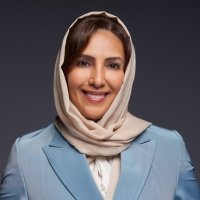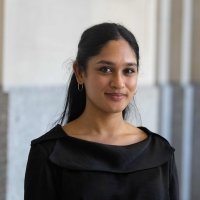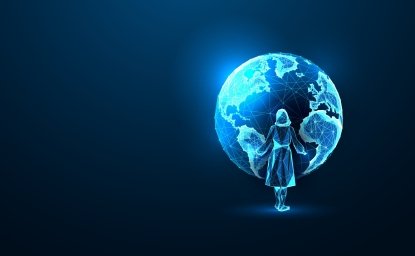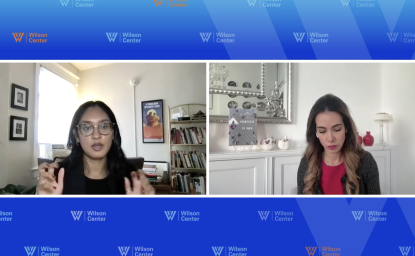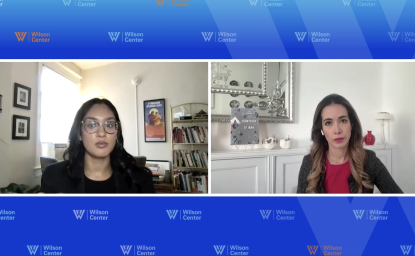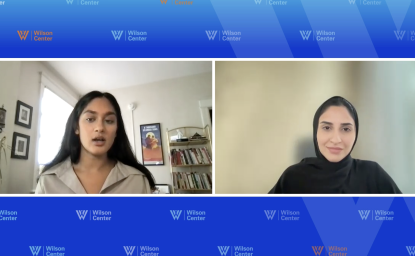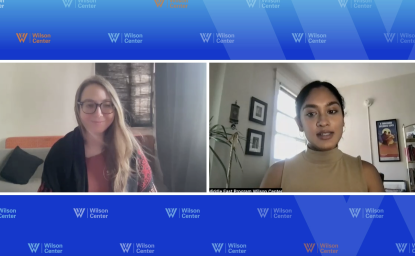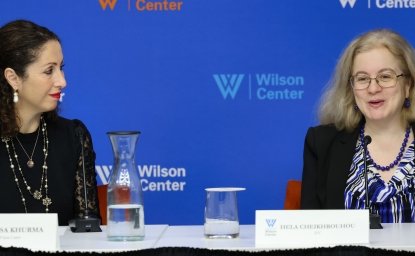This transcript has been lightly edited for clarity.
Enheduanna: Thank you for speaking with us today. We appreciate you taking the time. To begin, I’d love to know more about Nusf, how you came to found the organization, and what is motivating its mission.
Mae Al-Mozaini: Thank you for having me, I’m so delighted to be here. Nusf means half in Arabic, and our tagline is investing in half the population. Nusf was something that I developed throughout the years working in Aramco for 30 years, going up the leadership ladder and realizing that I have skills; I have experience; and I have leadership—what am I going to do with all of that? Especially at a time when Vision 2030 happened, and there was a whole stream dedicated to women’s empowerment. I figured this is what I wanted to contribute to: I wanted to contribute to Vision 2030 and to investing in women and empowering them. That’s our mission: to empower Saudi and Arab women, to help them contribute to their professional and leadership success.
I am Saudi, and I live here in Saudi Arabia. It’s the largest economy in the MENA region. I think we should establish it here first—as a Saudi person—and then expand it, open chapters in the rest of the Arab world. Why? Because women’s challenges are the same in the Arab world. Our numbers are different, but the challenges are the same. This would be a good place to start because of all the support we are getting. We use that to open up our chapters in different Arab countries.
Enheduanna: What programs does Nusf run for women, and what form does this programming take?
Al-Mozaini: Nusf is four and a half years old, but I’ve been working on Nusf for 10 years. When we launched it we wanted to make sure that we launched something that is holistic and sustainable our working model is based on three pillars:
Equip: That is our training arm and that where train women who are unemployed we upscale them to find employment, women who graduated and have just entered the job market, we train them also how to get their required skills to help them grow and then we have middle managers and up to executive level training
Research: We focus on identifying where the gaps are for Saudi women and making recommendations on best practices on how to close those gaps, we give them to companies who commission us
Connect: This is the most important pillar to me. This is where we connect as a society as citizens to bring down social barriers that get in the way of women’s advancement, so we reach out to the whole society, we reach out to men, who play an important role in women’s lives, we reach out to family members, we reach out to grandmothers, the mothers, the sisters, everybody, the aunties, everybody who has an influence on women, we reach out to them to discuss where our challenges are, our taboos and what we can do for all of us to rise.
Enheduanna: You’ve had a long career at one of Saudi’s biggest companies, Aramco, how does it compare in your view from where you began to now? Who is leading the change for women’s inclusion and empowerment?
Al-Mozaini: Well, for me, 30 years in Aramco, it doesn't say everything about me because I was born in Aramco Hospital. I was raised in the compound, and I used to work in the summer when I was a teenager. So, Aramco really was almost like a nation for me. And I picked up a lot of very valuable insights, processes, and lifestyle that I've been through and wanted to use the good parts on what I could do to add value to my own country. But Aramco back then was the only place, where from where I live, where it is a good environment for women to work in. So, I was very lucky to be living in the eastern Province where our headquarters, Aramco, is. And so, it's easier for me to get a job there. So it wasn't that difficult. But as the country continues to change, so does Aramco. Aramco has expanded from the day that I was a child, from the day that I was a small intern, and from the day that left it, it continues to change just like Saudi Arabia is changing every day. So, Aramco went through difficult times, and Aramco went through very, very prosperous times. And I would say working in Aramco for 30 years was to me equivalent to working for 100 different companies, because it is so large, and there are so many divisions. So, you get a lot of experience from working there.
And it does change. So, for instance, Vision 2030 has happened, and I always thought of Aramco as the most progressive company in our country. I don't think so now. I think that the government is much more progressive and going forward and a really fast pace—that I have to check the papers every day to see what is changing in my country.
Enheduanna: You mentioned the Vision 2030. And I'd like to ask you a two-pronged question. First is: how specifically you see Vision 2030 supporting the empowerment of Saudi women. And then on the flip side: how do you see the role of Saudi women in realizing Vision 2030. Is there a difference? Do you see them as complementary?
Al-Mozaini: So, I want to go before Vision 2030. Vision 2030 started in 2016—it’s eight years old now. Before that, the country had been investing in women. I mean, where would you find a country where school is free for all Saudi citizens, and public school, of course, is free for all. They invest in your education. When you go to college, they give you a stipend to stay in college, so you don't leave college to go find a job to help your family. They want you to stay in school, graduate from college, and then go find a job and help your family. That was a really big incentive.
Then there's the scholarship program, where the opportunities are open for men and women. There are huge numbers of women who have attended our scholarship program, which tells you about our country: investing and its population, and in particular women. We are the second-largest scholarship program in the world. We are second to China. It shows you how much money the country is investing in the education of youth. In fact, Saudi women are ranked, in education, number one in the MENA region and 10th globally. It tells you a lot about the investment that was made in Saudi Arabia.
Vision 2030 helped open opportunities for women. So, women had much more opportunities for them now that everything was clear, and there's a mandate and a stream explaining all of that. Companies are clear, and everybody wants to hire women because they know they're focused on their work and put in a lot of effort.
I've just been in a meeting with a law firm, where they had a young lawyer, a female lawyer, who had just joined them for a year. He told me— the lawyer that I was meeting with—that this woman is equivalent to three or four of the men that had worked for us. It’s just music to my ear that people want to hire women because she's trustworthy and gives her best—even though she has other responsibilities as she goes to her family, take care of her children, and so forth. But still her level of determination at work, [and] at school, is very high. We’re speaking about education.
Enheduanna: According to the latest data of the Global Gender Gap Report, Saudi has closed the gap—scoring at 63.7% on educational attainment, which you mentioned, and also high on the health and survival subindices. We’ve also seen remarkable strides from [Rayyanah] Barnawi to Haifa Al-Jadea in the government and especially in the STEM fields. We see a wide spectrum of women participating in the labor force in Saudi. In your eyes, do you see this continuing to trend positively? What are the challenges associated with this, and how and how do you see the role of the government or the private sector in overcoming these challenges?
Al-Mozaini: In Vision 2030 women are doing really, really well and doing remarkable, work. I see the trajectory in that the kingdom…working on improving itself all the time. We never claimed that we were perfect, but we're just trying to close our own gaps [and] our own challenges—we’re addressing them. We’ve come a long way.
The World Bank has recognized our efforts in achieving so many KPIs. I know we're going on the right trajectory.
What makes me even more proud is [that] Vision 2030 calls for increasing women's participation to 30%. It used to be 17% just a few years back [and] today we are at 37%. We’ve even bypassed our own KPIs. I'm anticipating that by 2030, we might even reach 40%.
All of this is giving you an indication that the kingdom is very supportive in investing in women, and women are highly educated. The transition was seamless for everybody because, we were prepared, and these were the lives that we were living in our own communities. But for the kingdom to open and the businesses to open that much for women, I think is just remarkable. And it's good for it's good for everybody. I mean, there is there is support.
Saudi Arabia is the only Arab country in the G20. I worked on the gender stream as part of the G20 for Saudi Arabia. We were working with all the Arab countries to provide representation for the Arab countries at the G20.
Saudi Arabia developed a report in conjunction with the G20 that said that investing in targeted training in Saudi women will generate a $400 billion return on investment by 2030.
It says a lot to what it does to the GDP when women are fully engaged in the economy. We still do admit that we still have a long way to go, but I look at women in different sectors, for instance, in STEM, in the Arab world and specifically in Saudi Arabia, have outnumbered women in STEM [compared to] in Silicon Valley [and] in the OECD countries.
Now, having said that that doesn't mean that's a really good sign. But also, the other sign that we need to pay attention to is where are the opportunities for women to use these STEM degrees so they could add further value.
And the ministries—different government ministries—are doing a lot to, address that and to change that. There's the Ministry of Communication that's done so much on budgeting, and they've invested a lot of money in technology and STEM fields.
Enheduanna: You mentioned two things specifically. You alluded very nicely to this year's International Women's Month theme, which is investing in women. I have two questions for you. It seems that mentorship, development, and training have played a role in your own professional and personal growth and development. And I see that through the mission of Nusf. And the second question is, you know, just as you've had this in your own career, how can we ensure that these benefits trickle down to other women?And, What have you seen as the tangible and measurable impact of Nusf?
Al-Mozaini: Nusf is a social enterprise. We are focusing on the youth and women—on the future leaders of this country, the female leaders of this country. That's and we feel that that's the best investment.
Mentorship is an important component of what Nusf does. Its focus is on mentorship. Why? It's because, during my 30-year career, I never had a mentor. I didn't even know what mentorship meant. I never had a male mentor. I never had a female mentor. There was this one person that I always admired—his business ethics—and I just followed what he was doing. I didn't know that was mentorship or not. But all in all, as I continue to become older, [I] realize the importance of mentorship and that my company, Aramco, previously was investing heavily in mentorship in the past 20 years.
This is where I needed to put a critical component for us—in mentorship. When I was in Aramco, I mentored around 70 women. They all came to my office, and it becomes a formal setting, [where] she's not relaxed. And it takes us about 10 to 15 minutes for her to ask questions that we can work together on. And that always bothered me. And so, this is what I decided to do when I left Aramco.
Through Nusf, we created “Walk the Talk.” “Walk the Talk” is a mentorship program where we identify 50 senior executive women, and we match them with 50 young professional women who've just entered the job market.
And because I live close to the Corniche, and we match them one-on-one, we ask them to walk for an hour or an hour and a half and have a mentorship session. First of all, the weather is beautiful—that's exercise. It's very casual. What helped us the most was the senior executive women came and thanked us, saying “We didn't know how to give back. Thank you for giving us this platform to help us.”
And the young ladies would say “It was impossible for us to reach senior women like that. There's just so many layers.” So, we removed all these barriers. [The] “Walk the Talk” program spread to five different cities, and we hope that it will continue to spread to all cities in Saudi Arabia and beyond.
It just tells you the importance of mentorship and women. Mentoring women is even more important, because they get to learn from a role model, have unique challenges and experiences, and help each other rise.
Enheduanna: Thank you for that. I don't want to take up too much of your time, so we'll wrap up here. And again, I thank you so much for taking the time to speak with us and tell us about the important work that you're doing.
